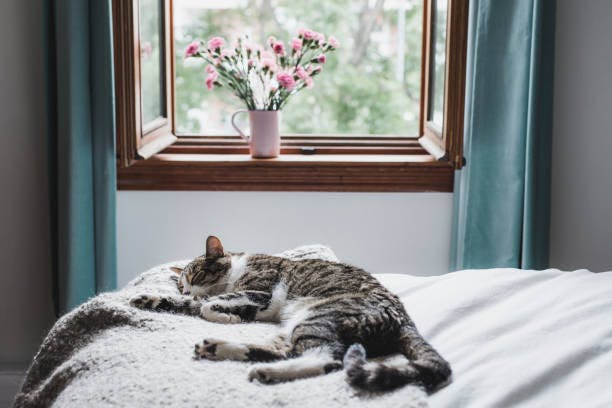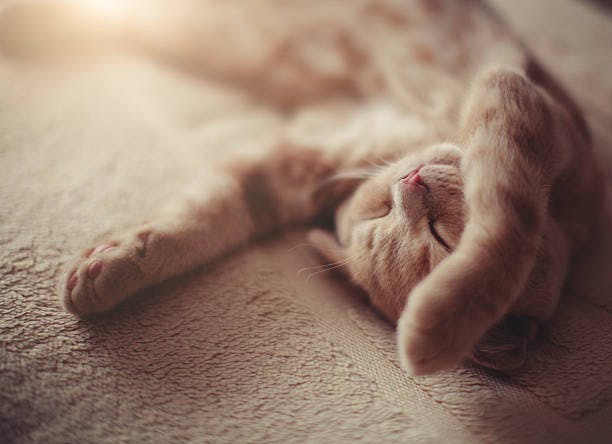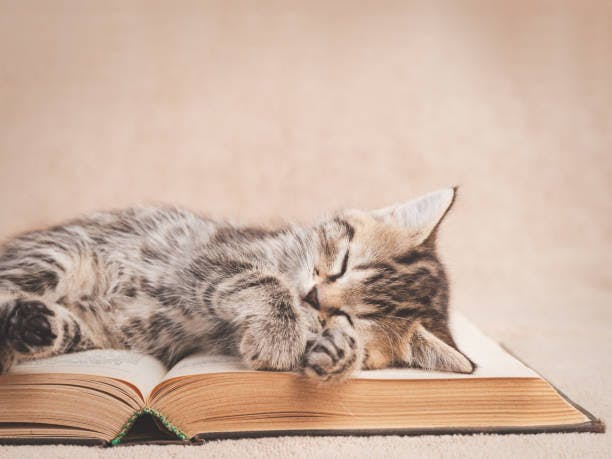Cats can be called true couch potatoes. They can be observed snoozing for twenty hours during the day! But did you know that in terms of science, everything is quite logical? A cat has to rest in order to recuperate after their daily activity. These felines spend quite a lot of energy running, climbing trees, walking along a thin fence like an equilibrist, and roaming here and there in the garden in search of mice and other rodents.

Why do cats need so much sleep?
A cat has to always be ready for action. A feline's brain sleeps in fits and starts for a quarter or half an hour. This is necessary for stress levels decreasing, improving memory, and not losing vigilance.
Cats are nocturnal! They inherited their habits from ancient ancestors who hunted in the dark. Many cat owners know that the closer it is to midnight, the more active their cat becomes. The felines rush all over the apartment, sweeping away all its carpets. They jump on the tallest furniture in the flat and quickly go down.
Cats also love early time, before dawn. At five a.m., the time comes to start the races, which tend to infuriate their sleepy owners. All this comes from nature - in ancient times, it was at night that the cat family went hunting.
Some cats still favor night over day. When a cat lives in a house with a human, they eventually have to adapt to the daily routine of the owner. There are some lucky owners whose cats sleep during the night, not bothering the neighbors at night. Still, other cats are true to ancient traditions and hunting instincts and try to get enough sleep during the day so that they could spend the energy at night. Usually, because of this, cats snooze so much when we don't.
Cat stress. Sometimes, a cat is under very strong stress and sleeps for this reason. A feline can be nervous because, for example, a lot of people come to the house - cats are very sensitive to changes in their usual course of affairs.
Just a boring life. Cats can sleep a lot for a banal reason - they are bored. This is easy to fix: interact with them every day.
A cat must-have toy. Buy your pet everything necessary for play. This includes not only expensive toys - you can get by with improvised items - ropes and foil balls. Equip a place where they can sharpen their claws. In the process of sharpening claws, cats not only groom them but also stretch their muscles. If you'll create a perfect scratching post, you will save your furniture. Sometimes, the felines tend to ruin furniture just out of boredom.
If there are always a lot of people and other animals in the house, the cat should have enough space where to hide, take a nap or practice some climbing skills.
Let your cat out for a walk, or provide a window seat so your pet can watch the outdoors. Sleep as a symptom of illness. Prolonged sleep may be a symptom of some diseases. If you see that your pet is sleeping more than usual, this is a reason to take them to the veterinarian. Perhaps the animal is sick.
Age of the cat. Over time, the habitual behavior of a cat can change. Just as a person in old age can constantly doze off, so can the cat. Kittens have a lot of energy and often replenish it when they sleep. In adolescence, kittens spend a lot of time playing. As the felines age, more sleep is needed to rejuvenate.
Breed features. This detail also affects the nervous system and temperament of cats. If the animal is bred through long-term selection and is intended not so much for work as for home keeping, the level of its activity will be lower. If the chain of evolution from a wild animal to a domestic pet is short, instincts prevail, and the wild cat begins to use the hours during which a domestic cat usually sleeps - for hunting.
For example, Maine Coon, Persian, British, Scottish and Siberian cats sleep a lot. The Burmese, Bobtail, Abyssinian, Siamese cat, or Oriental continue to stay awake while the owner is fussing around the house.

Do our beloved cats see dreams?
They do, just like humans. This can even be noticed in their behavior during sleep - they flex their paws, often twitching their tail. Most likely, they will be going through some of the events of the day. These movements during sleep are absolutely normal, and there is no cause for concern.
Cat sleep cycles:
Just like their owners, cats' brains go through sleep cycles. There are three such cycles:
Light sleep - the animal is relaxed, the eyes are closed, but they are alert. If hearing any rustle, the pet will immediately open its eyes.
Sleep with rapid eye movement - during this phase, one's consciousness is completely turned off, and rapid eye movement occurs. Cats do the same. They recapitulate the day, and it shows in their body movements. The activity of the brain is the same as during wakefulness. The phase of such sleep occupies 60% of all sleep, which is three times more than in humans.
Deep sleep - this phase is very important for both young animals and elderly felines. Throughout it, kittens grow, and their bones and muscles become longer. For an old cat, this is the time to accumulate energy.
During sleep, the brain regenerates the body. It is advised not to wake your pet at this time. You may think they are having a bad dream, but they aren't. They are just recapitulating that day's adventures. Quality sleep is imperative for the immune system and overall health. All felines seem to know this very well, which means that your cat is most likely not sleeping too much; it's just that you are sleeping too little.
Sleeping up to 20 hours a day is normal and even beneficial for your cat. Thus, you might even try to share this hobby with them and have more rest.
